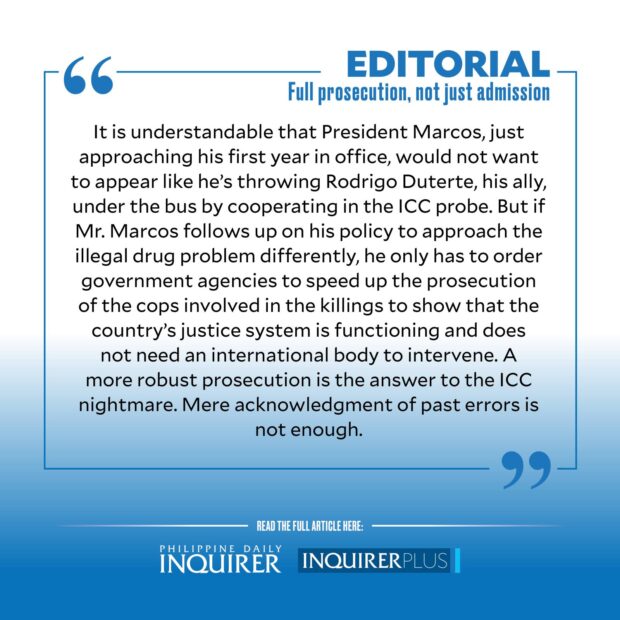
Mr. Marcos made the statement in a forum of the Center for Strategic and International Studies in Washington on the sidelines of his working visit last week to the White House.
Said the President: “In my view, what had happened in the previous administration is that we focused very much on enforcement. And because of that, it could be said that there were abuses by certain elements in the government and that [have] caused some concern with many quarters about the human rights situation in the Philippines.’’
Moreover, Mr. Marcos noted that despite the anti-drug campaign, drug “syndicates have grown stronger, wealthier, and more influential, worryingly so.” He went on to discuss how his administration took a different approach to the drug war by going after big drug syndicates and rehabilitating drug users.
“We are looking at the problem as a whole,” he said. “We start with the errant policemen, [then] we go back to the rehabilitation process for those who have unfortunately fallen into this addiction cycle.”
Though made before a foreign audience, the President’s statement is significant as it offers for the first time a tacit admission of the human rights violations committed in the Duterte drug war and is holding the state agents accountable for the killings.
The real test of Mr. Marcos’ sincerity, however, lies in how his statement would affect the very slow prosecution of cops implicated in the killings, and his government’s policy toward the investigation of the International Criminal Court (ICC).
Would the President’s statement give the Philippine National Police the impetus to be more open and cooperative in making every single police involved in the killings face prosecution? Will the Department of Justice change its defensive, even combative, stance toward calls to make other powerful people behind the drug war accountable as well?
Unfortunately, current policies and official pronouncements leave little room for optimism. For one, the PNP has released information on only 52 cases involving 150 police officers found by the PNP internal affairs services to be directly liable for the drug war killings. The President himself also announced earlier that the government will disengage with The Hague-based ICC after it rejected in March its motion to suspend the investigation. The President’s statement also appeared premature, as Solicitor General Menardo Guevarra immediately clarified that the Philippines will continue to wait for its appeal for the ICC to dismiss the investigation altogether.
On April 4, ICC prosecutor Karim Khan asked the court’s Appeals Chamber to reject the Philippines’ call to dismiss the case and authorize the ICC’s Pre-Trial Chamber to resume the investigation, citing the Philippines’ failure to prove errors in the ICC probe and contest its jurisdiction.
According to official figures from the Philippine Drug Enforcement Agency, a total of 6,252 drug suspects were killed in police operations as of May 31, 2022, a month before Duterte’s six-year term ended. Independent human rights groups, however, estimated the death toll to be as high as 30,000.
Only two convictions have so far been handed down by the courts. In March, a Navotas court sentenced Caloocan policeman Jefrey Sumbo Perez to 40 years without parole for killing teenagers Carl Angelo Arnaiz and Reynaldo de Guzman in 2017. The first conviction, in 2018, was that of Caloocan police officers Arnel Oares, Jeremias Pereda, and Jerwin Cruz for the gruesome killing of 17-year-old Kian delos Santos in 2017.
With this dismal rate of prosecution, the Philippines does not have the ground, moral or factual, to disregard the ICC’s probe.
To fend off a full-blown ICC trial and international embarrassment, the Marcos administration must continue to engage in the process of accountability and search for justice in the drug war. It must build on the President’s latest pronouncement acknowledging the abuses and violations, and prove that it has the willingness and capacity to conduct a serious investigation of these dubious deaths.
It is understandable that Mr. Marcos, just approaching his first year in office, would not want to appear like he’s throwing Duterte, his ally, under the bus by cooperating in the ICC probe. But if Mr. Marcos follows up on his policy to approach the illegal drug problem differently, he only has to order government agencies to speed up the prosecution of the cops involved in the killings to show that the country’s justice system is functioning and does not need an international body to intervene. A more robust prosecution is the answer to the ICC nightmare. Mere acknowledgment of past errors is not enough.

